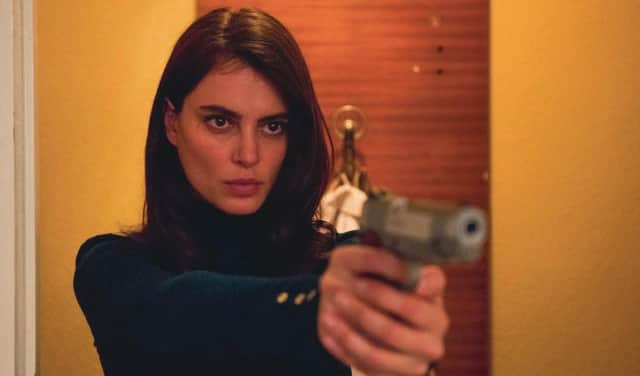Film reviews: The Whistlers | Infinite Football | In Search of Greatness | The Wretched


The Whistlers (15) ****
Infinite Football (N/A) ****
In Search of Greatness (N/A) ***
The Wretched (15) **
In The Whistlers and Infinite Football, Romanian director Corneliu Porumboiu continues to interrogate his country’s past in playfully profound ways. Premiering a year apart at Cannes (The Whistlers debuted last year, Infinite Football the year before), but released for the first time on VOD this weekend, they make an intriguing double bill, reconfirming the full range of Porumboiu’s talents as both the sly political satirist and humanist behind 12:08 East of Bucharest and Police, Adjective, and as a master filmmaker able to deconstruct the very forms he’s working in.
At first glance the films couldn’t be more different. Where The Whistlers initially plays like a self-conscious genre exercise, Infinite Football is a low-key documentary following one man’s obsessive quest to develop a new version of the beautiful game. And yet, as other stories intrude on what we think are the main narratives and subtle tonal shifts start to reveal deeper truths beneath the absurdity of their respective premises, neither film conforms to the expected beats of their respective formats.
Advertisement
Hide AdIn The Whistlers, that absurdity stems from the film’s titular conceit. As it opens, its protagonist, a crooked cop named Cristi Anghelache (Vlad Ivanov), arrives on the Canary Island of La Gomera to infiltrate a gang intent on using the local whistling language to communicate with each other and avoid surveillance as they attempt to steal e30 million. Though Cristi’s allegiances aren’t entirely clear – he may be using his undercover status for his own financial betterment or testing the degree of corruption required to get the job done – we know that his arrival on La Gomera has something to do with Gilda (Catrinel Marlon), a beautiful femme fatale, also from Bucharest, who may or may not be playing the gang off against the Romanian criminal they’re planning to steal the loot from.
Porumboiu doesn’t shy away from the set-up’s inherent movie-like nature here. In fact, as the film’s fractured narrative proceeds, he draws attention to it, even contriving a way to have the film’s big action scene take place on an abandoned film set. But seasoned viewers of Porumboiu’s work will also recognise The Whistlers as a sly sequel to Police, Adjective – not just in its exploration of the way language is used to negotiate a specific milieu, but in the literal sense too: Ivanov is reprising his officious police captain from that film, only here he’s been recast as a man adrift in a world where the prescriptive certainties of a country in the process of putting its legacy as a police state behind it has given way to a very different form of ruthlessness: the everyone-for-themselves chaos of post-financial-crash Europe. Amid all the geeky film references and breezy heist-going-wrong shenanigans, this gives The Whistlers real substance.
In some respects Infinite Football is also an exploration of a search for order in the years since Ceausescu’s fall in 1989 and, later, Romania’s entry into the EU in 2007. This time, however, Porumboiu is exploring it via a far gentler character with a more optimistic view of humanity. This is Laurentiu Ginghina, a middle-aged bureaucrat whose quixotic plan to reinvent football – it involves splitting the field in two and subdividing the teams to make the players more static and the ball more fluid – echoes, at first, the confusion of Nigel Tufnel’s efforts to make guitar amplifiers louder in This Is Spinal Tap. But this is no exercise in mockery or exploitation. Ginghina is an old acquaintance of Porumboiu (the director was friends with his younger brother in school) and, as we gradually learn his story over the film’s densely packed 70-minute running time, Porumboiu presents us with a remarkable portrait of how an ordinary man’s personal history can intersect with the political realities of his times and inspire him to apply what turns out to be a formidable intelligence to develop not so much a new sport, but a blueprint for a new way of living. The leaps that get us there are so subtle that the philosophical reach of the film’s finale – which, like The Whistlers, is built around a linguistic flourish – proves unexpectedly thrilling.
Sport happens to be the lens through which documentary maker Gabe Polsky (Red Army) explores the over-used term of genius in his new film In Search of Greatness. Extensive interviews with the likes of Canadian ice hockey legend Wayne Gretzky, American Football star Jerry Rice and Brazilian football supremo Pelé lend credence to his thesis that talent can’t be quantified and honed into excellence through rigorous statistical analysis. On the contrary, it needs to be allowed to develop creatively at a young age so that it can thrive by allowing its possessor to push against the boundaries and regulations of their chosen field of excellence when their passion becomes their profession. It’s a very watchable doc, if a little vague when it expands its scope beyond its main interviewees to explore musical mavericks like Bowie, Hendrix and The Beatles.
A horror movie about a witch preying on the children of a small American town sounds like the sort of schlocky movie that could nevertheless have interesting things to say about gender in the current era. Sadly, The Wretched has very little on its mind beyond serving up a few nifty special effects in service of a plot stitched together from various slasher movies of yesteryear.
The Whistlers and Infinite Football are available on Curzon Home Cinema; In Search of Greatness is available to stream on Amazon Prime, iTunes and Now TV; The Wretched is available on all major VOD platforms